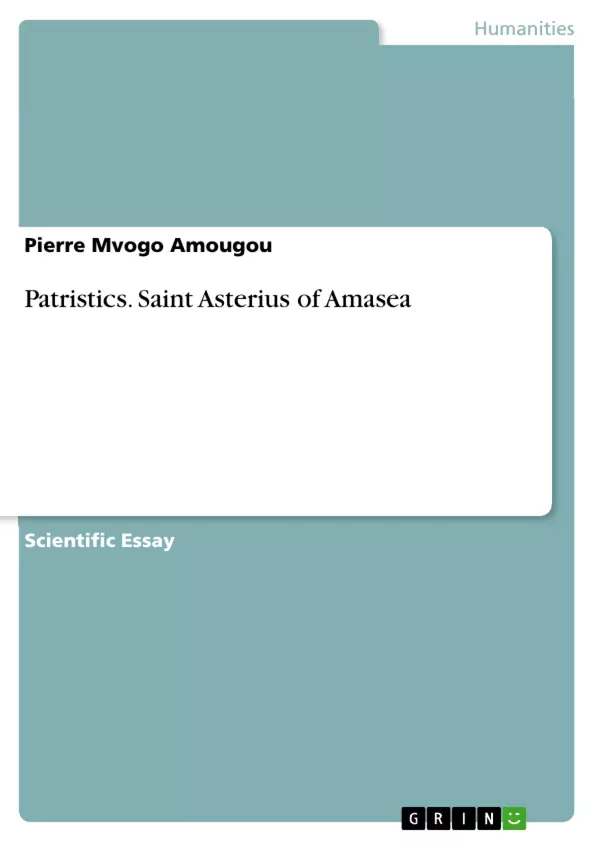Saint Asterius of Amasea is the name of a little known man, but important. He is the fourth or fifth century Christian bishop whose work has been cited from the Second Council of Nicea onwards on the subject of religious icons and ecclesiastical art work. He is a treasure; a source of important information around the religious practices of polytheists in the later years of the Roman Empire. We have barely one fact concerning his early education. His principal teacher was a Scythian, who in his youth had been sold as a slave to a citizen of Antioch. His owner was a schoolmaster, and took great pains in educating him thoroughly. He made marvellous progress in learning and won for himself a great name among both Greeks and Romans. He preached in the latter part of the fourth century, among his sermons, we shall dwell on the sermon against divorce and our work will be scheduled as follows: First we shall see the life of Saint Asterius and his works; secondly, we will talk about the stylistic essence of his sermons, thirdly we shall depict the particularities of his writings, thereafter we shall discover his doctrine against divorce, and finally we will analyse his sermon against divorce.
Inhaltsverzeichnis (Table of Contents)
- INTRODUCTION
- I. LIFE AND WORKS
- a. LIFE
- b. WORKS
- II. THE STYLISTIC ESSENCE OF THE ASTERIAN SERMONS
- III. PARTICULARITIES OF THE WORKS OF ASTERIUS
- IV. THE TEACHING OF ASTERIUS OF AMASEA AGAINST DIVORCE.
- V. ANALYSIS OF THE SERMON ON DIVORCE
Zielsetzung und Themenschwerpunkte (Objectives and Key Themes)
This work aims to provide a comprehensive study of Saint Asterius of Amasea, a fourth or fifth century Christian bishop, and his teachings, focusing on his sermon against divorce. The text examines his life and works, analyzes his stylistic essence and particularities, explores his doctrine against divorce, and delves into a detailed analysis of his sermon on this subject.
- The life and works of Saint Asterius of Amasea
- The stylistic essence of Asterius' sermons
- The particularities of Asterius' writings
- Asterius' teachings against divorce
- Analysis of Asterius' sermon on divorce
Zusammenfassung der Kapitel (Chapter Summaries)
- INTRODUCTION: Introduces Saint Asterius of Amasea and his importance as a source of information about the religious practices of polytheists in the Roman Empire. Outlines the structure of the work.
- I. LIFE AND WORKS: Discusses the limited knowledge of Asterius' life and family. Provides details about his birth in Cappadocia, his death in Amasea, his background in rhetoric and law, and his subsequent rise to become metropolitan of Amasea. Mentions his contemporaries, Basil the Great, Gregory of Nyssa, and Gregory of Nazianzus. Lists some of his works, including sermons on various topics like pagan customs, the rich man and Lazarus, and the martyrdom of St. Euphemia.
- II. THE STYLISTIC ESSENCE OF THE ASTERIAN SERMONS: Highlights the literary value of Asterius' sermons due to their fluent, clear, and direct style. Explains how he utilizes simple introductions and brief but impactful conclusions to engage his audience. Emphasizes his reliance on biblical references and his commitment to using pure and accessible language.
- III. PARTICULARITIES OF THE WORKS OF ASTERIUS OF AMASEA: Explores the unique elements of Asterius' writing style, such as his insightful formulations of biblical characters and situations. Points out his emphasis on Christian morality and his portrayal of society through his works.
- IV. SUMMARY OF THE SERMON ON DIVORCE OF ASTERIUS: Summarizes Asterius' sermon against divorce, focusing on his interpretation of Jesus' words to the Pharisees. Discusses his views on marriage as an unbreakable bond and the roles of both husband and wife within the union.
Schlüsselwörter (Keywords)
Saint Asterius of Amasea, sermons, Christian bishop, divorce, marriage, biblical references, stylistic essence, particularities, Christian morality, religious practices, Roman Empire, polytheists, rhetoric, law, Cappadocia, Amasea.
- Quote paper
- Pierre Mvogo Amougou (Author), 2020, Patristics. Saint Asterius of Amasea, Munich, GRIN Verlag, https://www.grin.com/document/1131044



